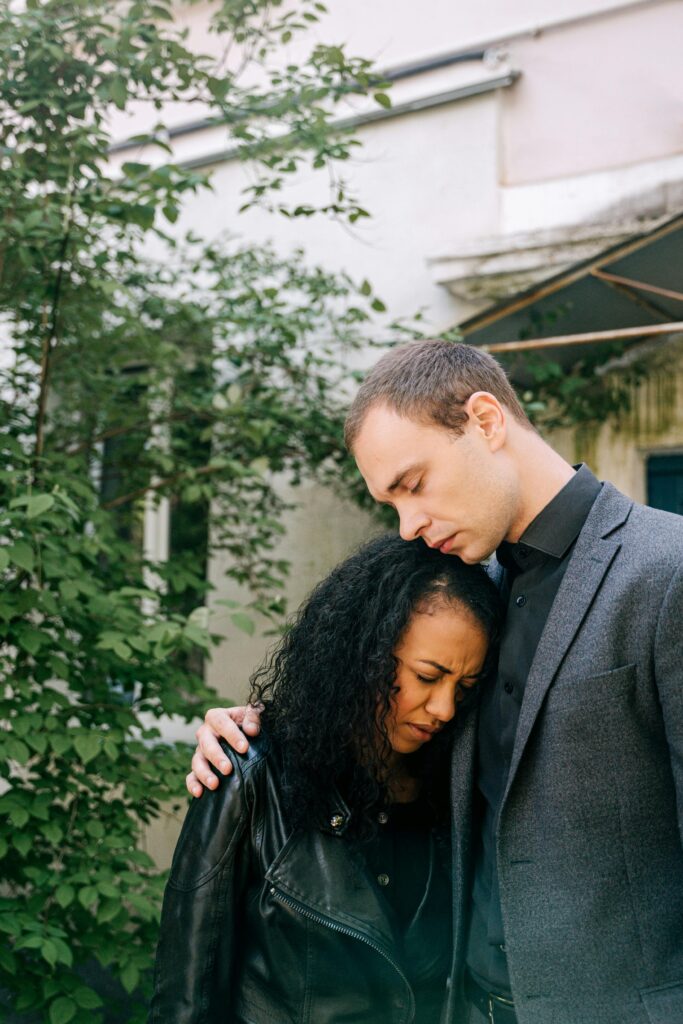
Losing a loved one to suicide is a profoundly heartbreaking experience. You have to cope with grief and loss of losing someone you care about. At the same time, suicide leaves many of us with feelings of guilt, shame, and anger. It might feel like you have no one to talk to about your loss. And talking about it may bring feelings of shame or of having not done enough. Coping with that loss is a deeply personal journey and one that will require time, patience, and self-exploration.
For many of us, it also means taking steps to seek out professional help for trauma, understanding and cope with our underlying feels of guilt, and to learning more about how to move on so you can live your life despite those feelings.
What is Suicide Bereavement?
Suicide is surprisingly common in the United States, with an estimate death every 11 minutes, or 49,000 deaths by suicide in 2022 alone. A further 1.6 million people that year felt so hopeless and pushed to the end that they attempted suicide and 3.8 million of us made a suicide plan. That tragedy of ending a life early when mental health help and improving life circumstances would likely have fixed the underlying issue is dismaying. Yet, for those of us left behind, suicide can result in trauma, complicated grief, and decreases in mental health and wellness that can also increase out own risk of suicide and self-harm.
According to John Jordan, a leading authority in this field, having a loved one die of suicide can result in “suicide bereavement”. This condition of prolonged mourning and emotional distress is characterized by guilt, shame, and stigma, which are not present in other types of loss. You might be asking yourself “Why didn’t I see the signs”, “Couldn’t I have done anything”, “Did I do enough?” and the emotional intensity of dealing with questions can take years to get over.
The Emotional Complexity of Suicide Loss

Experiencing grief puts life on hold. For many of us, grief is a major temporary disability in which we experience depression, anxiety, poor stress management, and deep feelings of sadness and loss for 6-12 months or longer. With suicide, those feelings are further complicated by factors like stigma, guilt, and anger.
- Taking Responsibility – It’s hard not to blame yourself when things go wrong. Whether you think you could have done something to prevent your loved one’s loss, think your own behavior contributed, or blame yourself for not being there enough, these feelings of guilt turn into trauma for you. According one study, these are cognitive distortions, where the survivor is experiencing a mental health disorder and needs therapy to help recognize those distortions for what they are.
- Feelings of Anger – You may be looking for someone to blame. Yourself, the world, your loved one. It’s normal for you to feel abandoned, betrayed, left to deal with the pain of being alive alone. The closer you were to your loved one, the worse these feelings will be. Those feelings don’t go away but instead will require significant processing to realize that there is no one to blame and that’s often how things work.
- Feelings of Shame – Losing a loved one is supposed to mean being able to talk about that loss and your loved one’s death. But, for those of us who lost our loved one to suicide, that option can go away. There’s still a significant sense of stigma attached to suicide and survivors report feeling judged or ostracized by others. Those feelings can be imagined based on shame or can be very real, as members of your community may have feelings about suicide that then reflect negatively on your family or your household. People also often don’t know what to do or say around suicide and may back away – leading to feelings of shame.
Get Your Questions Answered
Our expert & caring staff on site are available 24/7. Call us today.
Coping Strategies to Support Healing

Coping with loss and grief isn’t easy. For many of us, it’s a deeply personal journey that should take many stops as you uncover new parts of how you feel.
Giving Yourself Time – Grief takes time. For most of us, that’s between 6-12 months before we start to feel like ourselves again. For complex grief and suicide bereavement, that can take longer. You might have good days and bad days; you might do better for weeks and then crash again. You might feel pressured to move on quickly, especially as your loved one chose to end their life themselves. Yet, you’re not obligated to do any of these things. It’s your mental health and your feelings. It’s important that you take the time you need to feel, to process, and to fall apart. Without that space, you might end up inflicting complex trauma on yourself and that will require much more time and therapy to work out. You need space for grief, without judging yourself, so you can begin to heal at your own pace.
Professional Support – It’s important to look into professional help and therapy. Here, your therapist can help you to overcome the trauma of suicide, can help you to overcome the challenges of self-blame and guilt in suicide, and can help you to deal with grief in a healthy way. Cognitive behavioral therapy mixed with grief counseling and complementary therapies to help you uncover and process emotions is often the way to go but ideally, you want a custom treatment program that’s aligned with your specific needs. Treatments that offer grief counseling alongside trauma therapy are also ideal, because you are likely dealing with both at once.
Support Groups – Being a suicide survivor can result in significant isolation and feelings of loneliness. Seeking out support groups, either through group mental health treatment or self-help groups, can help you to feel less alone. Here, you can look into groups offered by the American Foundation for Suicide Prevention (AFSP) which are available in person and online. Support groups ensure that you share your feelings in a group of peers who share those experiences, hear from others, and reinforce that you are not alone, that you are not to blame (unless everyone there is also to blame), and that you have people who understand. Those feelings can be difficult to find elsewhere, which is why support groups are considered an important part of recovery in suicide bereavement.
Invest in Self Care – Going through a period of grief will often mean that you have lapses in self-care that make it harder for you to take care of yourself. Maintaining your own physical and mental health while processing grief can be difficult. It’s easy to fall apart and you may have days when you aren’t capable of doing anything. It’s important to make sure you’re taking care of yourself as much as you can around that. For example, getting enough sleep, going to bed and waking up at about the same time every day, eating nutritious meals, keeping the house relatively clean, getting physical exercise most days. It’s also a good idea to ask for help, to have friends come over to support you, and to do things like pay for meal prep or a cleaning service if you can afford it and can’t keep up with these things yourself.
Addressing Trauma – It’s important to understand that you have experienced trauma. Chances are very high that you will benefit from addressing it directly. That means going to therapy, talking to counselors, and talking to your medical providers about that trauma. Trauma informed care means they will take that trauma into account when delivering medical care.
There’s no easy fix to trauma and grief after the suicide of a loved one. Also, there’s also no closure. You might never get a satisfying explanation of why your loved one chose to end their life. Instead, suicide is often the result of mental illness, stress, and personal crises, which come together to a feeling of hopelessness. There may be no good reason, and you may have to learn to cope with that trauma. Often that means giving yourself time, getting mental health help, and taking things one step at a time.






